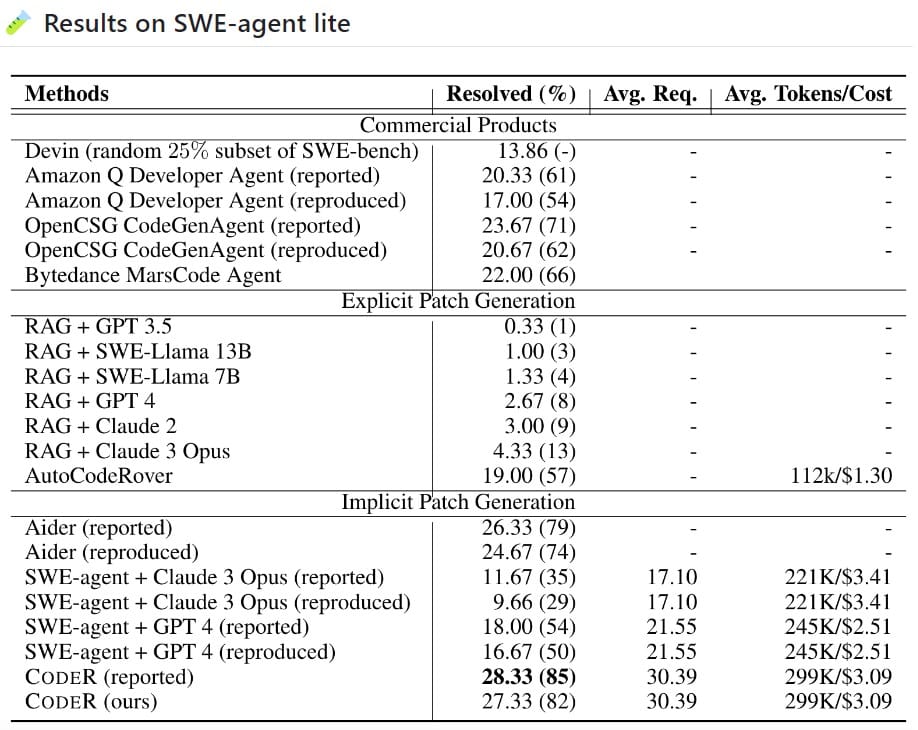AI-Powered Developer Tools Roundup - 2024-07-07

CodeR: Issue Resolving with Multi-Agent and Task Graphs
CodeR is a system designed to repair and resolve reported bugs and add new features within code repositories using a multi-agent framework and pre-defined task graphs.

Key Features:
- Utilizes a multi-agent framework and pre-defined task graphs to address GitHub issues.
- Achieves a 28.33% success rate in solving issues on SWE-bench lite with a single submission per issue.
- Focuses on both bug fixing and new feature implementation in code repositories.
- Provides performance analysis and insights to advance research in automated issue resolution.
Source: https://github.com/NL2Code/CodeR
STORM: Synthesis of Topic Outlines through Retrieval and Multi-perspective Question Asking
STORM is a system that generates Wikipedia-style articles from scratch using Internet search and large language models (LLMs).
Key Features:
- Breaks down article generation into pre-writing (research and outline creation) and writing stages.
- Uses perspective-guided question asking and simulated conversations to improve depth and breadth of research.
- Modular implementation using dspy framework allows for customization of different components.
- Supports various LLM backends including OpenAI, Claude, and open-source models via VLLM or Together AI.
- Integrates with search engines like You.com and Bing for information retrieval.
- Includes evaluation metrics for assessing outline and article quality.
Source: https://github.com/stanford-oval/storm
Autodoc: Toolkit for Auto-Generating Codebase Documentation Using LLMs
Autodoc is an experimental toolkit that automatically generates documentation for git repositories using LLMs. It indexes codebases and creates documentation for each file and folder, which can be queried using a CLI tool.
Key Features:
- Indexes entire codebases through depth-first traversal, generating documentation for files and folders using LLMs.
- Provides a CLI tool for querying generated documentation, allowing developers to ask questions about the codebase.
- Supports OpenAI's GPT models, with plans to include self-hosted models like Llama and Alpaca in the future.
- Generates documentation that resides within the codebase, traveling with the code.
- Offers cost estimation for indexing based on file content and token count.
Source: https://github.com/context-labs/autodoc
Code Review GPT: AI-Powered Code Review in CI/CD Pipelines
Code Review GPT automates code reviews using LLMs, streamlining the process by providing feedback on potential issues and areas for improvement in your CI/CD pipeline or locally.
Key Features:
- Integrates with CI/CD pipelines to review code automatically.
- Identifies common issues like exposed secrets, inefficient code, and readability problems.
- Offers local command-line functionality for reviewing staged files.
- Provides a GitHub Action for easy integration into existing workflows.
- For example, you can run it locally to review staged files before committing.
Source: https://github.com/mattzcarey/code-review-gpt
VERT: Verified Rust Transpilation Using LLMs
- A tool that produces readable Rust transpilations with formal correctness guarantees.
- It uses a Web Assembly compiler to create an oracle Rust program and an LLM to generate a readable candidate program.
- The candidate is verified against the oracle, regenerating if verification fails.
- Evaluation on 1,394 competitive programming benchmarks shows significant improvements in passing property-based testing and bounded model-checking compared to using an LLM alone.
Tools you can use from the paper:
No implementation tools or repository links are provided.
Source: VERT: Verified Equivalent Rust Transpilation with Large Language Models as Few-Shot Learners